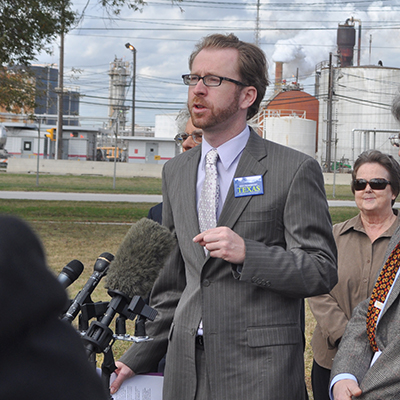
Electric cars at the Houston Auto Show
This weekend, hundreds of thousands of people attended the Houston Auto Show to see the latest that the automakers have to offer. While the main focus of this year’s auto show was still traditional gas-burning vehicles, attendees were able to test drive plug-in electric models like the 2019 Bolt EV, the Honda Clarity plug-in hybrid, and Nissan’s LEAF. Debuting for the first time were Audi’s e-tron, BMW’s i8 electric convertible, and the Hyundai Ioniq plug-in hybrid. Hyundai’s Kona EV, Jaguar’s all-electric I-PACE and the Range Rover plug-in hybrid were also on display. These cleaner, electric, zero-emission vehicles are the future of transportation; that is they must be if we hope to have a livable climate.
This weekend, hundreds of thousands of people attended the Houston Auto Show to see the latest that the automakers have to offer. While the main focus of this year’s auto show was still traditional gas-burning vehicles, attendees were able to test drive plug-in electric models like the 2019 Bolt EV, the Honda Clarity plug-in hybrid, and Nissan’s LEAF. Debuting for the first time were Audi’s e-tron, BMW’s i8 electric convertible, and the Hyundai Ioniq plug-in hybrid. Hyundai’s Kona EV, Jaguar’s all-electric I-PACE and the Range Rover plug-in hybrid were also on display.
These cleaner, electric, zero-emission vehicles are the future of transportation; that is they must be if we hope to have a livable climate.
America’s cars, planes, trucks and other vehicles now produce more global warming pollution than any other sector of our economy. In Texas, the transportation sector accounts for 34% of statewide carbon emissions. Houston saw the tragic impacts of a warming climate firsthand during Hurricane Harvey. Through warmer air and water, and rising sea levels, climate change makes hurricanes more powerful and dangerous. We can’t prevent the worst impacts of global warming – and protect a healthy, stable climate for our children and grandchildren – without cleaning up our cars.
Today, 99 percent of the cars, SUVs and pickup trucks on the road in the U.S. still burn gasoline, pumping carbon pollution into our planet’s thin, fragile atmosphere and increasing the risks from global warming. Americans need a clean, well-functioning transportation network that gets people where they need to go, efficiently and without emitting greenhouse gases. Safe access to biking, walking, and mass transit will play a major part in the solution, but due to the suburban growth of the 20th century, many people will remain reliant on cars.
To help reduce the massive emissions of our transportation system, we need to shift to electric cars as quickly as possible.
As the top oil producing state in America, Texas may seem like an unlikely place to advance electric vehicles (EVs). But more EVs on the road would have a profound impact on reducing air pollution, oil usage and carbon emissions in-state. Houston is home to more than 2 million people and hosts some of the worst regional air pollution.
Incentivizing these cleaner cars will provide cleaner air for our kids. The statewide EV rebate runs out this year, and legislators should renew and extend the rebate during this legislative session. Consumers will also need more places to recharge their batteries to make the choice to drive an electric vehicle, so our leaders in Houston and throughout Texas should continue to invest in more EV charging infrastructure.
Houston Mayor Sylvester Turner is leading by example by working to convert the city’s fleet to electric vehicles. Leadership from local governments creates opportunities for immediate emission reductions, supports innovative businesses, and demonstrates the potential for EVs to the public. It is up to all of us to push our leaders to take bold action on climate.
Authors
Luke Metzger
Executive Director, Environment Texas
As the executive director of Environment Texas, Luke is a leading voice in the state for clean air and water, parks and wildlife, and a livable climate. Luke recently led the successful campaign to get the Texas Legislature and voters to invest $1 billion to buy land for new state parks. He also helped win permanent protection for the Christmas Mountains of Big Bend; helped compel Exxon, Shell and Chevron Phillips to cut air pollution at four Texas refineries and chemical plants; and got the Austin and Houston school districts to install filters on water fountains to protect children from lead in drinking water. The San Antonio Current has called Luke "long one of the most energetic and dedicated defenders of environmental issues in the state." He has been named one of the "Top Lobbyists for Causes" by Capitol Inside, received the President's Award from the Texas Recreation and Parks Society for his work to protect Texas parks. He is a board member of the Clean Air Force of Central Texas and an advisory board member of the Texas Tech University Masters of Public Administration program. Luke, his wife, son and daughters are working to visit every state park in Texas.

